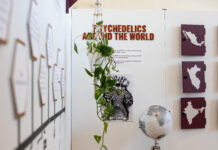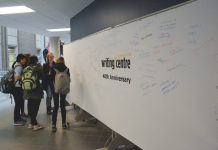by Harleen Kaur Dhillon
Lori Campbell, Director of St. Paul’s Waterloo Indigenous Student Centre, believes it’s important to learn from the experiences of ancestors.
“[Through her memoir Maria Campbell] shares Canadian history. She tells us in a very personal way, her story, a story of so many people who have been made to keep silent,” she said.
On Oct. 15, Campbell defended her aunt, Maria Campbell’s 1973 biography, Halfbreed, at the Waterloo Reads Battle of the Books.
The annual Battle of the Books is held every year in October since 2013 at the WPL, and includes special guests and local celebrities. All of the invitees defend a book that they think is important for others to read, and attendees vote on the argument that won them over the best.
Campbell emphasized the importance of recognizing the resistance of Indigenous people that started long before this generation was born.
“Halfbreed is a book that offers insight into the circumstances of the Metis peoples, more particularly women, and the important role they hold in the history of Canada. She talked about things that were uncomfortable, but they were the truth,” she said.
Campbell took home the first place trophy. The second and third places went, respectively, to R.S. Johnson, a local radio personality and Lynn Macauley, Initiative Coordinator with the Homelessness and Housing Umbrella Group.
They defended Stephen Fry’s Mythos and Katherina Vermette’s The Break, respectively. Campbell is proud of her win and her choice of book. Halfbreed is still painfully relevant, and an important read for Canadians wanting to learn more about the Indigenous history of Turtle Island.
Although Halfbreed covers many difficult issues, Campbell said that the main idea is not bitterness. The focus of the story is the strength and perseverance of Indigenous peoples.
“This is not a story about trauma, victimization and pain, but rather it is about resilience and the undeniable strength of Indigenous peoples,” Campbell said.
Campbell also talked about the importance of continued resilience, and not losing oneself to bitterness.
“[Maria Campbell] offers us insight into the situation of the Metis peoples in Canada and in particular, the hatred and racism that they have experienced,” Campbell said. “But she also says, ‘I am not bitter. I have passed that stage. I only want to say: This is what it was like; this is what it is still like. I know that poverty is not ours alone. Your people have it too, but in those earlier days you at least had dreams, you had a tomorrow. For me, the win is just a proud moment. I know that I championed my auntie’s book well, but I also feel strongly that Maria Campbell’s story is a story that all Canadians should be interested in,” Campbell said. “I had fun, but also tremendous pride.”
Halfbreed has been published in eight countries and in four languages. Maria Campbell also has numerous awards including, the Order of Canada, the Pierre Elliott Trudeau Foundation Fellowship, and the Vanier Award.
































